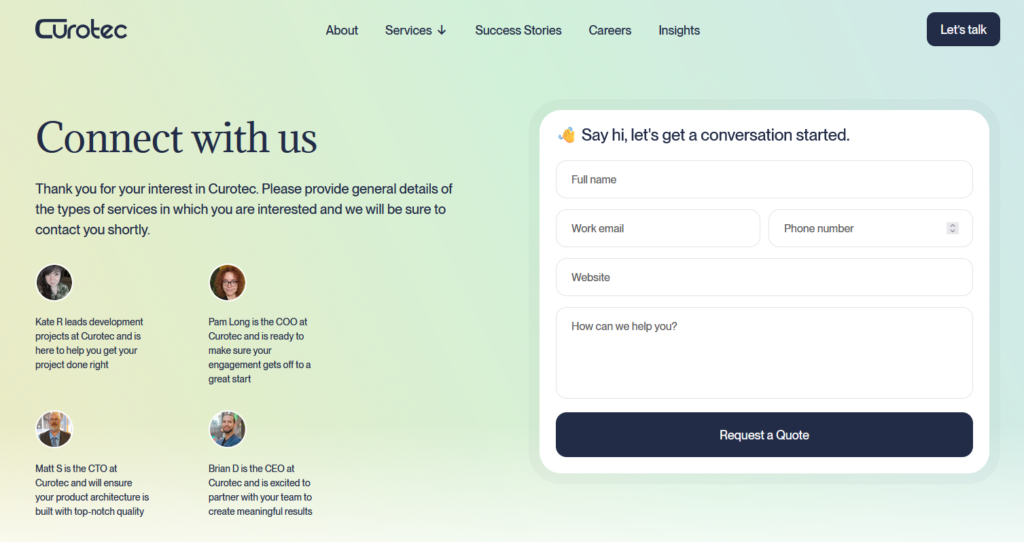By the Software Development Experts at Curotec
Embracing Innovation: The Strategic Role of Custom Software in Manufacturing
In an era where technological advancement sets the tempo for competitive industries, manufacturing stands out as a field consistently seeking efficiency and innovation. Within this sphere, the term “custom software” refers to bespoke applications designed to streamline and enhance manufacturing operations. It is distinct from general-purpose software or specialized software used in fields like embedded computing for military applications. This post delves into the critical indicators, tangible benefits, and strategic considerations that guide a manufacturer’s journey toward adopting custom software.
Defining Custom Software in a Manufacturing Context
Before delving into the strategic benefits, it’s important to clarify what “custom software” means in the manufacturing domain. This refers to software solutions developed to address a manufacturing operation’s unique challenges and requirements. Unlike standard off-the-shelf software, custom solutions are tailored to fit a manufacturer’s intricate workflows, production processes, and data management needs. These can be quite different from software designed for embedded systems or military use.
Recognizing the Need for Custom Software

The transition from off-the-shelf software solutions to custom-built systems marks a significant milestone in a manufacturer’s growth and evolution. This decision is often precipitated by a clear recognition of certain limitations or inefficiencies in existing systems.
Manufacturers might find themselves constrained by software that no longer resonates with their evolved business processes or lacks the scalability to support growth. The need for seamless integration, real-time data analytics, or the automation of complex, industry-specific workflows often becomes the catalyst for change. Custom software, with its potential to perfectly align with a manufacturer’s operations, offers a promising solution to these challenges.
Key Triggers for Considering Custom Software
Embarking on the journey of custom software development is a decision often triggered by specific operational needs or strategic objectives:
- Scaling Operations
As a company grows, its operations become more complex, necessitating a robust, flexible, and scalable software solution. Custom software can evolve with the company, adeptly handling increased production complexities and seamlessly integrating with new machinery or processes.
- Unique Process Requirements
Every manufacturing operation has nuances, and there are instances where generic software solutions fall short in addressing the particularities of specific manufacturing workflows or industry regulations. Custom software can be designed to cater to these unique requirements, ensuring that every facet of the operation is optimally supported.
- Data Integration and Analysis
In the age of big data, manufacturers are inundated with information. Consolidating, analyzing, and acting on this data can give manufacturers a significant competitive advantage. Custom software can provide a unified platform for data integration, offering real-time insights and data-driven decision-making capabilities.
Advantages of Custom Software in Manufacturing
The adoption of custom software in the manufacturing sector brings a multitude of advantages:
- Enhanced Process Optimization
Custom software can be designed to streamline manufacturing workflows, reduce waste, and optimize resource utilization, leading to significant efficiency improvements.
- Improved Quality Control
By integrating with existing quality control systems, custom software can ensure that products consistently meet quality standards, reducing the risk of defects or non-compliance.
- Supply Chain Integration
Effective supply chain management is crucial for manufacturers. Custom software can offer real-time insights into inventory levels, vendor performance, and logistical operations, facilitating proactive decision-making and inventory management.
Real-World Use Case: James E. Fulton & Sons
Navigating Operational Inefficiencies
James E. Fulton & Sons, a reputable construction and excavation company based in Southwest Michigan, grappled with overwhelming paperwork and operational inefficiencies. The company’s staff managed over 1,000 pieces of paper weekly, a cumbersome process that offered limited insight into crucial areas like equipment maintenance.

Streamlining for Growth
They also faced the challenge of handling six different timesheet formats and the labor-intensive task of manually generating weekly client updates. These inefficiencies were time-consuming and a drain on the company’s resources and productivity.
Embracing Digital Transformation
Recognizing the need for a digital overhaul, Fulton & Sons partnered with a software development firm to create a custom web-enabled application. This innovative solution included a mobile employee app designed to streamline and automate their back-end systems comprehensively. The application was a game-changer for the company, revolutionizing HR functions and job site management.
Revolutionizing Daily Operations
One of its standout features was a unified timesheet interface, which replaced the previously used formats. Additionally, the app automated the process of generating weekly updates for clients, significantly reducing the time required for paper reconciliation from days to just a few hours per week.
Cultivating a Dynamic Work Environment
This digital transformation’s impact extended beyond operational efficiencies. Fulton’s employees enthusiastically embraced the mobile app, which significantly reduced the time and effort spent on repetitive administrative tasks. This not only enhanced their productivity but also boosted morale and job satisfaction. Integrating automated back-end processes and a newly motivated workforce profoundly affected the company’s culture, fostering a more dynamic and efficient work environment.
Realizing Tangible Benefits
The success of this custom software solution was evident in its tangible benefits to Fulton’s bottom line. The company could allocate more resources to its core construction and excavation services by reducing time spent on administrative tasks. This shift improved operational efficiency and enhanced the company’s competitiveness in the industry.
The partnership with the software development company and the subsequent digital transformation exemplify how custom software solutions can be a catalyst for significant improvements in business processes, employee engagement, and overall financial performance.
Evaluating the Decision to Build Custom Software
Adopting custom software requires meticulous evaluation and planning. Manufacturers must conduct a comprehensive cost-benefit analysis, weighing the long-term benefits of a custom solution against the initial investment.
Equally important is the selection of a development partner. The right partner brings technical expertise and a deep understanding of the manufacturing sector and its unique challenges. They should have a proven track record of delivering custom solutions that drive operational efficiency and strategic growth.
Custom Software Offers Transformative Capabilities
This exploration into the realm of custom software in manufacturing paints a vivid picture of its transformative capabilities. As seen through the lens of success stories like that of James E. Fulton & Sons, it’s clear that when strategically implemented, custom software can streamline operations and elevate a company to new heights of efficiency and market competitiveness.
For manufacturers poised at the crossroads of innovation, embracing custom software isn’t just an operational upgrade—it’s a strategic move towards future-proofing their business in an ever-evolving industry landscape.
Ready to Explore the Strategic Benefits of Custom Software in Manufacturing?
Whether you’re looking to scale operations, address unique process requirements, or harness the power of data-driven decision-making, custom software could be the key to unlocking your company’s full potential.
Take the next step towards operational excellence and competitiveness by considering the possibilities of custom software tailored to your manufacturing needs.
Schedule a free consultation with Curotec’s seasoned development team to embark on your path towards innovation and operational efficiency.
About Curotec & The Simon Group’s Partnership
Curotec has been the trusted website development partner of The Simon Group for over 5 years. We’ve worked together to create and/or manage nearly a dozen websites in that time, for our industrial, high-tech and embedded computing clients as well as ourselves.

